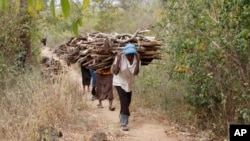According to a new joint report issued by United Nations Environment Program (UNEP) and Interpol, Kenya loses 70,000 hectares of forest each year to illegal logging.
The report, released ahead of this weekend's observation of World Environment Day, also says weak Kenyan laws are largely to blame.
While individuals cut down many trees to make charcoal, which provides energy for approximately 80 percent of urban and 35 percent of rural households, Christian Nellemann, the report's author, says organized crime is the main culprit.
“Well, the primary intent of this is simply to feed organized criminal networks with profit," he said. "Most of these networks are either focused on charcoal or high value logs for export particularly to Asia.”
The Kenya Forest Service (KFS) is the agency responsible for preserving the country’s wooded areas.
Charity Munyasi, deputy director in charge of forest conservation and management, disputed the report, saying KFS is executing its mandate with efficiency.
“That report is not telling the truth because actually the illegal loggers in this country have [been] reduced," she said. "We have even removed issues of those people who want to be given logging licenses without saw mills, and Kenya Forest Service does not allow people without legal licenses to remove wood from the gazetted forest areas.”
Interpol cites the coastal city of Mombasa as a conduit for the illegal logging trade.
“Kenya, with its port in Mombasa, is a significant transit point for a lot of timber — and a lot of illegal timber — moving ... from other parts of Africa ... before heading on to Asia and also the Gulf states," said Davyth Stewart of Interpol’s Environment Security Program.
The report calls on Kenya needs to adapt its law enforcement mechanisms, warning that failure to do so means forfeiting the war to save the environment to shrewd criminals.
“What you’ve got," said Stewart, "is criminal groups moving in. They are operating in a very sophisticated manner, using shell companies and very elaborate tax schemes that are set up, looking at various legal loopholes and using those to help launder the timber and to launder the proceeds. And law enforcement is struggling to keep up. The investment in law enforcement is not enough.”
According to government data, forest covers about seven percent of Kenya's land.




